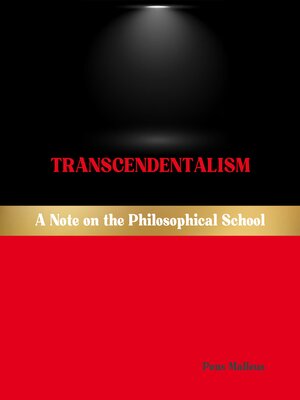Transcendentalism
audiobook (Unabridged) ∣ A Note on the Philosophical School · Western Philosophical Schools
By Pons Malleus

Sign up to save your library
With an OverDrive account, you can save your favorite libraries for at-a-glance information about availability. Find out more about OverDrive accounts.
Find this title in Libby, the library reading app by OverDrive.



Search for a digital library with this title
Title found at these libraries:
| Library Name | Distance |
|---|---|
| Loading... |
This audiobook is narrated by a digital voice.
In an era marked by dizzying technological advances, material excess, and relentless distractions, the call to pause, reflect, and rediscover the inner self has never felt more urgent. This audiobook arises from that need—not merely to look inward, but to look beyond. It explores Transcendentalism, a philosophical and spiritual movement born in 19th-century America, yet brimming with relevance for contemporary life.
Transcendentalism was never merely a set of doctrines or a literary flourish. It was—and remains—a call to awaken the deeper capacities of the human spirit. Rooted in the writings of figures such as Ralph Waldo Emerson, Henry David Thoreau, Margaret Fuller, and Bronson Alcott, the movement sought to challenge the prevailing norms of its time: institutional religion, mechanistic science, rigid social hierarchies, and the blind march of industrial progress. In their place, Transcendentalists proposed a radical trust in the individual, a belief in the inherent goodness of people and nature, and a conviction that truth transcends what can be seen, measured, or codified.
This audiobook is not a nostalgic exercise, nor is it a hagiography of a few long-dead thinkers. Instead, it is a sustained engagement with the essential ideas of Transcendentalism—themes of self-reliance, the moral imagination, civil disobedience, communion with nature, and the search for the sublime—and their implications for the present. Transcendentalism invites us to ask: What does it mean to live a meaningful life? What is our responsibility to society, and to the Earth itself? How do we reconcile individuality with community, intuition with reason, and idealism with action?







